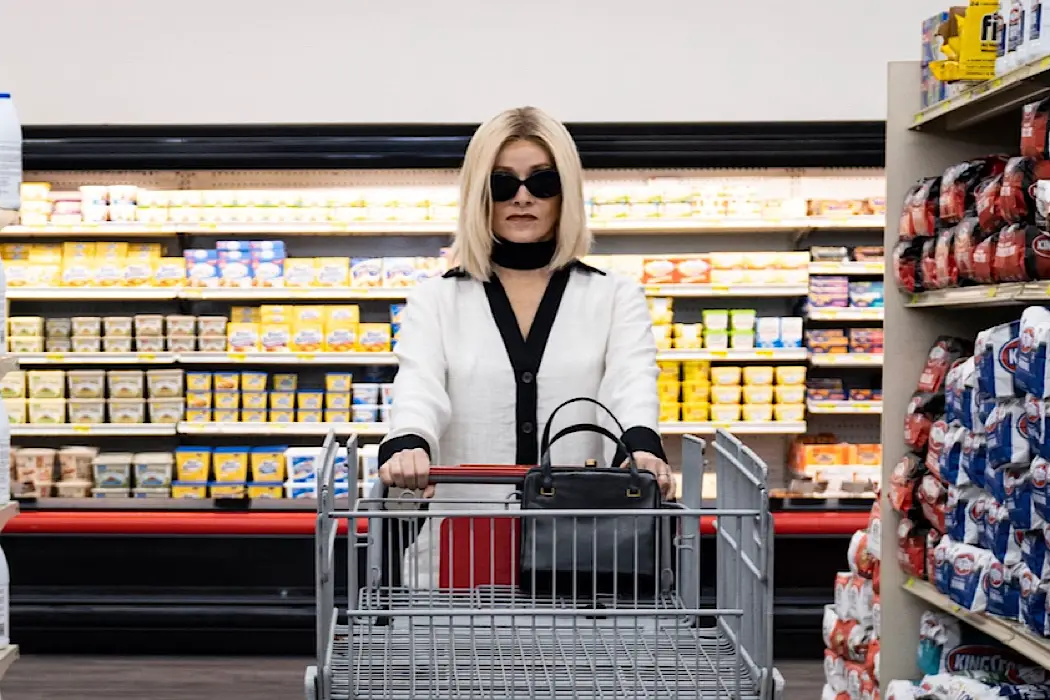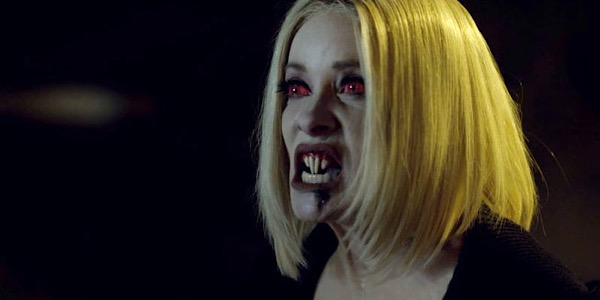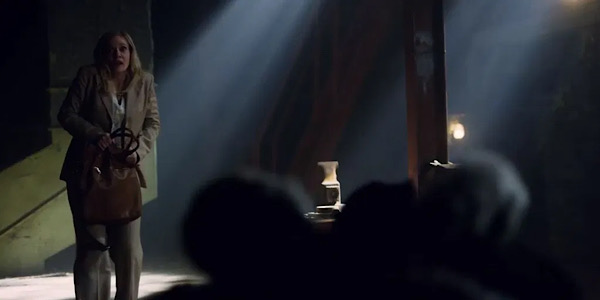Interview with Travis Stevens, director of JAKOB’S WIFE
April 19, 2021

Kristy Strouse
Kristy Strouse is the Owner/Editor in Chief of Film Inquiry,…
Travis Stevens’ newest Jakob’s Wife, which recently premiered at the 2021 SXSW Film Festival, delivers us a hilarious yet insightful take on the vampire subgenre. I was able to speak with director Travis Stevens about the creative influences and themes, vampire movies, and the star power of Barbara Crampton.
This is Kristy Strouse with Film Inquiry. I really enjoyed your film. And I’m a big horror fan so always happy to watch new content in that genre. Congratulations on Jakob’s Wife!
Travis Stevens: I appreciate it. I also appreciate you giving an anniversary shout-out on Twitter for Slither!
Thanks, it is a great one! How did you first get attached to direct the film?
Travis Stevens: So, Barbara [Crampton] had been sent the script years ago, and she immediately fell in love with this character, and then from there, she was sort of nurturing it, developing it, trying to get it made, and worked with another writer, Kathy Charles. When I was out promoting Girl on the Third Floor, she reached out and said, “Hey, would you be interested in reading this passion project of mine?” I immediately said yes, we had worked together on We’re Still Here, and what was so exciting to me was that she was taking a more active role as a producer. There’s this correlation between what the character in the film does to reclaim her identity and what Barbara was now doing as a filmmaker, and it was immediate for me to say yeah, I want to do everything I can to help you do this and to have it be as successful of a transformation as possible.
I love those parallels between her character and what she was kind of doing in her life. That’s really interesting. When you read the script, what were your initial thoughts?
Travis Stevens: The movie was there, it was clear as day, the characters were there, and my work on it was just about focusing the story on areas that I thought we were going to best highlight. I think, in horror films in particular, it’s easy to be black and white, really binary, and this is a story about a character who’s lost the confidence in their own voice and who reclaims that confidence, reclaims her agency. A lot of my work on the screenplay was about focusing on that, making sure that both what Anne’s life is like before this fantastic element comes into it and what her life is like after that. I really wanted to make sure that it was servicing that theme.

I think you do a great job of that! In the beginning, she really seems like the title would suggest, as “Jakob’s” wife rather than Anne. There’s a sense of ownership and a feeling of loss for who she is. Can you touch on that?
Travis Stevens: I mean it’s certainly what I connect to, as, as a filmmaker. What is the value of this story? What is the story trying to say? And is that something that has value outside of just the entertainment factor? So, I think with all the movies I make, there will be a core theme that has something bigger to say than just scariness. With Jakob’s wife’s there’s this examination of how our lives can become strangled, and our voices become strangled, and we don’t know how it happened, but suddenly, we’re in a position where we don’t feel that we’re living as big as we imagined we would. That was the movie for me. And we use the vampire aspect of it as an allegory to just talk about what you need to do to break free of that, that constricted feeling. In the case of Jakob and Anne, she goes through this fantastic transformation, and then their relationship needs to adjust to account for it. And that’s a lot, creatively that’s a lot of fun to have that at the core of a vampire movie. Another aspect is that this movie itself transforms, along with the character. It starts in one world as one type of movie and then transforms as she does. So, there’s a bit of playing with the actual format of film itself. Then there’s another aspect, as I touched on earlier, which is Barbara Crampton‘s story, she is literally transforming her professional career in making this. All three of these elements I think are empowering in different ways, but also in parallel. Part of the movie’s transformation, sort of a constricted, small town, drab banal life into this wild over the top 80’s style horror film is in honor of the films that she burst onto the scene with. These are like classic horror movies that are in a very specific style and itself, like a fun way to sort of honor her legacy for the movie to reach that point, that same level of over-the-top, fun, kind of humorous- horror.
Yeah, and I love that I think that there were actually a lot of tonal variations, with a lot of deep themes to it as well. As far as the influences I’m curious if you have any specific ones? I definitely felt Salem’s Lot in there, which I love.
Travis Stevens: Yeah, I mean one of them, at least for me, and this was the same on Girl on the Third Floor, like if you’re working in a sub-genre, whether it’s a haunted house movie or a vampire movie, there is an opportunity there to pay homage and draw from your favorite films in that sub-genre. So, there had been movies that I felt were like… perfect vampire movies. But, when you’re creating one yourself you’re drawing different aspects so, I love the Gothic small-town feeling of Tobe Hooper Salem’s Lot. I thought Grace Jones performance in Vamp was great. Daughters of Darkness has this stylish feminine sexuality and power. Bill Gunn’s Ganja & Hess- I thought that core relationship and the sort of the poetry of the filmmaking just was really beautiful. Also, Let the Right One In I think is tonally masterful in how it balances that sort of tragedy of that story and the humor, as well as the execution, I mean that’s like, as good as it gets in my life.
I agree!
Travis Stevens: Personally, I love Werner Herzog’s Nosferatu, the aesthetics of it, and the absurdity. The way the humor sort of comes into that in that sort of manic edge, what Kinski‘s performance has, that was definitely a quality I wanted to infuse into Jakob’s Wife. Also, Abel Ferrara’s The Addiction, and how he was able to sort of strip the movie down to the very bare, location, and characters, and still have it feel gothic. It’s this wonderful mix, it was the thing we were trying to do in a different setting. We were trying to take small-town America and give it this gothic feel. It was 100% drawn from what Abel did with The Addiction, in New York. I also think Tony Scott‘s The Hunger, for me growing up, that was the first time I was like, “Oh Vampires are cool, they are like… cool.” They’re not the previous generation’s version of cool, they were like… our cool. In our time!
I understand, completely!
Travis Stevens: That was fun! There are also some links to A Girl Walks Home Alone at Night, and Bram Stoker’s Dracula.
Any more? [Laughs] You named a lot of fantastic ones!
Travis Stevens: [Laughs] I love the question because I’m like, there are so many! It is such a great sub-genre because you can use a vampire, to tell a story about anything relevant to that time and place, and culture. And so, it’s been just really interesting to just revisit these movies that were made in very specific times and see how they’re using the vampire to comment on that time or express it, so I get excited by that question. That’s what I am hoping with contemporary audiences and future audiences, when they look at Jacob’s wife, they’ll see that we’re using a vampire story to say something relevant about the times we’re living in.

Yeah, absolutely, I agree! Do you feel horror is really your home? What do you look for when working on a project?
Travis Stevens: I like a wide variety of movies. You know, I make a lot of documentaries as well, and some of them are movie-related, but not all of them. For me it’s…what is the core idea of this project, and do I emotionally connect to it? Do I see a path from that idea forward like, probably true for any, any filmmaker, what is it about this thing that appeals to me, and what makes me suited to be the author of it? I love horror, like we just said about the vampire genre like horror, in general, is very valuable, and you can make movies about different things. And as long as there’s a threat element in there, it’s easier to get made. So yeah, I mean I think I’ll always make horror films but I would never say that that’s the only type of movie I want to make, because it’s not the only type of movie I’ve made. I’d love to make a GI Joe movie one day.
Awesome, well maybe it’ll be a vampire GI Joe movie!
Travis Stevens: [Laughs] Yeah.
Thank you for talking to me again, congrats on the movie I have a lot more questions but I know you have to go. It was really wonderful speaking with you!
Travis Stevens: Thank you so much.
Film Inquiry wants to thank Travis Stevens for taking the time to speak with us.
Jakob’s Wife is in select theaters, on-demand and digital April 16th.
Does content like this matter to you?
Become a Member and support film journalism. Unlock access to all of Film Inquiry`s great articles. Join a community of like-minded readers who are passionate about cinema - get access to our private members Network, give back to independent filmmakers, and more.
Kristy Strouse
Kristy Strouse is the Owner/Editor in Chief of Film Inquiry, writer, podcaster, and all around film and TV fanatic. She's also VP of Genomic Operations at Katch Data and is a member of The Online Association of Female Film Critics and The Hollywood Creative Alliance. She also has a horror website: Wonderfully Weird & Horrifying.













